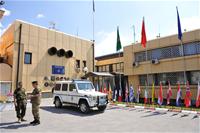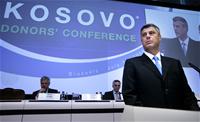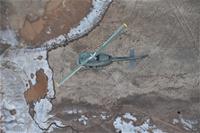Serbia and Kosovo sit at the negotiations table, three years later
Evelyna Topalova, March 9, 2011
 On the third anniversary of the unilaterally declared independence of Kosovo from Serbia, Belgrade and Pristina are preparing to take their seats at the negotiations table, this time not to discuss the status but to find a solution to problems concerning people's daily life. While the Serbian side declared its preparedness for the talks at the end of last year, the Kosovo authorities have just set up their team as they had to wait for the results from the December early elections and appointment of the new government.
On the third anniversary of the unilaterally declared independence of Kosovo from Serbia, Belgrade and Pristina are preparing to take their seats at the negotiations table, this time not to discuss the status but to find a solution to problems concerning people's daily life. While the Serbian side declared its preparedness for the talks at the end of last year, the Kosovo authorities have just set up their team as they had to wait for the results from the December early elections and appointment of the new government.
Borislav Stefanovic, a political adviser with Serbian foreign ministry, was appointed as head of Belgrade's delegation, while the Kosovo team is headed by Deputy Prime Minister Edita Tahiri.
The dialogue on "technical issues" was initiated after the UN Security Council passed last September a resolution calling for direct EU-brokered talks between the two sides. Belgrade softened the initial document that was intended to be submitted after the International Court of Justice ruled that Kosovo's independence did not violate international law.
The first direct talks between the two sides since 2008 are expected to focus on a range of issues like the fate of missing persons from the 1998-1999 conflict, the usage of Serbian car plates on Kosovo territory, trade relations.
Kosovo officials have said repeatedly that the status issue would not be subject of the talks. It is still unclear whether another sensitive issue will be discussed - the predominantly populated by Serbs northern Kosovo, which is slipping out of Pristina's control. Parallel Serb structures, that are refusing to recognise Kosovo authorities, are still present in this part of Kosovo.
The first meeting between the two delegations was scheduled for March 8th in Brussels. The EU named its facilitator in the talks - Robert Cooper who is special adviser to EU foreign policy chief Catherine Ashton. Although the agenda of the talks was yet to be defined, the two sides said they would engage in the dialogue in a constructive manner and would seek ways to resolve people's problems.
How did the situation both in Belgrade and Pristina change in the past several months in anticipation of the dialogue?
The government in Serbia is facing increasing criticism from the opposition which accuses it of bad management of the country and of the high unemployment rates. The main opposition force - Serbian Progressive Party (SNS) - organised mass a anti-government rally on February 5th and gave the government a two-month deadline to call early elections.
Meanwhile, Prime Minister Mirko Cvetkovic said that coalition partners have reached an agreement on a government reshuffle. The changes involve reducing the number of portfolios from 25 to 20 but details are yet to be announced. The authorities have at least managed to register substantial progress in EU integration process, after delivering very quickly the answers of the European Commission's questionnaire. Technical expert missions are currently in Serbia to verify on the ground how the country meets criteria for acquiring an EU candidate status.
Pristina finally got its new coalition government headed by incumbent Hashim Thaci. He managed to strike coalition agreement with controversial businessman Behgjet Pacolli and minorities in order to secure his second term in office.
The other main parties represented in parliament refused to cooperate with Thaci accusing him of corruption and bad management. The government was elected  despite serious accusations of Council of Europe's rapporteur Dick Marty suggesting that former leaders of Kosovo Albanian rebels, including Thaci, had been involved in human organs and weapons trafficking and other illegal activities during and after the Kosovo conflict. International representatives in Pristina have repeatedly called for "clean-hands" government.
despite serious accusations of Council of Europe's rapporteur Dick Marty suggesting that former leaders of Kosovo Albanian rebels, including Thaci, had been involved in human organs and weapons trafficking and other illegal activities during and after the Kosovo conflict. International representatives in Pristina have repeatedly called for "clean-hands" government.
Pacolli's party decided to back Hashim Thaci in an exchange of a presidential seat for its leader. The election of tycoon Pacolli, who is thought to be the richest Kosovo Albanian and who is not very popular among Kosovars because of his close business ties with Moscow, faced its first test after two opposition parties took the issue to the Constitutional Court.
Pacolli was elected president only in the third round of voting in parliament with simple majority after he failed to receive the necessary two-thirds of the votes in the previous rounds (some representatives of Thaci's party said openly they would not follow the official party's stance). The opposition claims that parliamentary procedures were breached as there was no quorum in the hall. Furthermore between the second and the third round of voting a break was declared which is contrary to procedures. Now it is up to the court to rule on the case.
 The same court concluded last year that the President at the time, Fatmir Sejdiu, had violated the constitution by holding leadership of his Democratic League of Kosovo (LDK) simultaneously. The ruling triggered Sejdiu's resignation that was followed by his party's decision to leave the government and thus provoked early elections.
The same court concluded last year that the President at the time, Fatmir Sejdiu, had violated the constitution by holding leadership of his Democratic League of Kosovo (LDK) simultaneously. The ruling triggered Sejdiu's resignation that was followed by his party's decision to leave the government and thus provoked early elections.
Serbs and Kosovo Albanians are engaging in these talks determined to defend their positions but also to prove that they can talk in a European spirit. Compromise, however, seems unlikely to be achieved easily but here comes the role of the European Union that should try to balance the positions and to encourage the two sides to make concessions.
 Bakir Izetbegovic, Andrej Plenkovic | © Council of the EU
Bakir Izetbegovic, Andrej Plenkovic | © Council of the EU Aleksandar Vucic, Recep Tayyip Erdogan | © Serbian Presidency
Aleksandar Vucic, Recep Tayyip Erdogan | © Serbian Presidency Jean-Claude Juncker, Zoran Zaev | © European Commission
Jean-Claude Juncker, Zoran Zaev | © European Commission